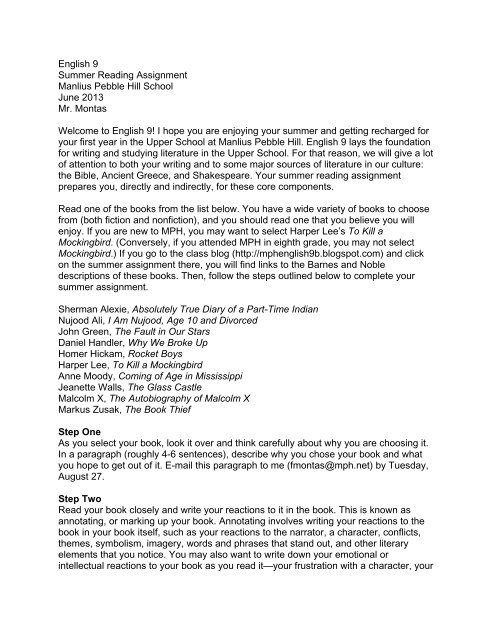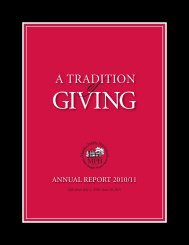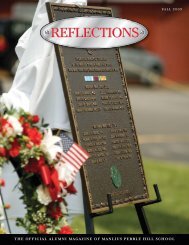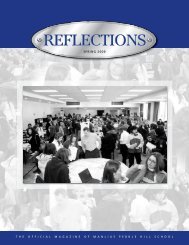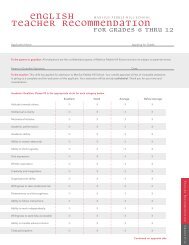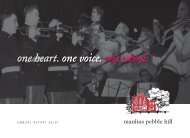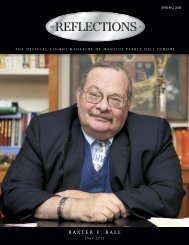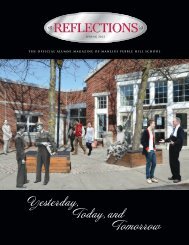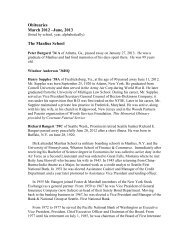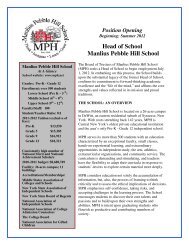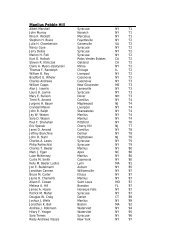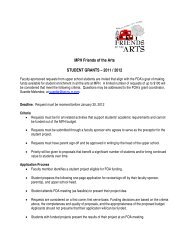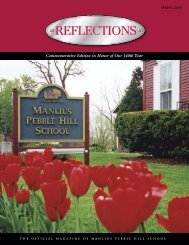English 9 Summer Reading Assignment Manlius Pebble Hill School ...
English 9 Summer Reading Assignment Manlius Pebble Hill School ...
English 9 Summer Reading Assignment Manlius Pebble Hill School ...
Create successful ePaper yourself
Turn your PDF publications into a flip-book with our unique Google optimized e-Paper software.
<strong>English</strong> 9<br />
<strong>Summer</strong> <strong>Reading</strong> <strong>Assignment</strong><br />
<strong>Manlius</strong> <strong>Pebble</strong> <strong>Hill</strong> <strong>School</strong><br />
June 2013<br />
Mr. Montas<br />
Welcome to <strong>English</strong> 9! I hope you are enjoying your summer and getting recharged for<br />
your first year in the Upper <strong>School</strong> at <strong>Manlius</strong> <strong>Pebble</strong> <strong>Hill</strong>. <strong>English</strong> 9 lays the foundation<br />
for writing and studying literature in the Upper <strong>School</strong>. For that reason, we will give a lot<br />
of attention to both your writing and to some major sources of literature in our culture:<br />
the Bible, Ancient Greece, and Shakespeare. Your summer reading assignment<br />
prepares you, directly and indirectly, for these core components.<br />
Read one of the books from the list below. You have a wide variety of books to choose<br />
from (both fiction and nonfiction), and you should read one that you believe you will<br />
enjoy. If you are new to MPH, you may want to select Harper Lee’s To Kill a<br />
Mockingbird. (Conversely, if you attended MPH in eighth grade, you may not select<br />
Mockingbird.) If you go to the class blog (http://mphenglish9b.blogspot.com) and click<br />
on the summer assignment there, you will find links to the Barnes and Noble<br />
descriptions of these books. Then, follow the steps outlined below to complete your<br />
summer assignment.<br />
Sherman Alexie, Absolutely True Diary of a Part-Time Indian<br />
Nujood Ali, I Am Nujood, Age 10 and Divorced<br />
John Green, The Fault in Our Stars<br />
Daniel Handler, Why We Broke Up<br />
Homer Hickam, Rocket Boys<br />
Harper Lee, To Kill a Mockingbird<br />
Anne Moody, Coming of Age in Mississippi<br />
Jeanette Walls, The Glass Castle<br />
Malcolm X, The Autobiography of Malcolm X<br />
Markus Zusak, The Book Thief<br />
Step One<br />
As you select your book, look it over and think carefully about why you are choosing it.<br />
In a paragraph (roughly 4-6 sentences), describe why you chose your book and what<br />
you hope to get out of it. E-mail this paragraph to me (fmontas@mph.net) by Tuesday,<br />
August 27.<br />
Step Two<br />
Read your book closely and write your reactions to it in the book. This is known as<br />
annotating, or marking up your book. Annotating involves writing your reactions to the<br />
book in your book itself, such as your reactions to the narrator, a character, conflicts,<br />
themes, symbolism, imagery, words and phrases that stand out, and other literary<br />
elements that you notice. You may also want to write down your emotional or<br />
intellectual reactions to your book as you read it—your frustration with a character, your
anger with a plot development, your sympathy for a narrator, and so on. If you are<br />
using a library book, you may record your thoughts on post-it notes or in a notebook. (If<br />
you use a notebook, be sure to keep track of page numbers.) Your annotated book (or<br />
your set of notes) is due the first day of class. For more about annotating, see the<br />
following web sites, which are linked on the class blog:<br />
How to Mark a Book (reflection and opinion)<br />
How to Mark a Book (directions and instruction)<br />
How to Do a Close <strong>Reading</strong> (from Harvard’s Writing Center)<br />
Step Three<br />
Respond to one of the following scenarios. Your response must be at least two pages<br />
long in 12-point Times font, double spaced, with one-inch margins. It is due the first<br />
class meeting of the school year, either Tuesday, September 3 (Day 1), or<br />
Wednesday, September 4 (Day 2). As I evaluate your writing, I will look for five things:<br />
that you can express yourself clearly, that you can support your points with evidence,<br />
that your writing shows you can read for literary meaning, that your writing follows<br />
standard grammar and mechanics, and that you can put all of these together in a<br />
coherent piece of writing.<br />
Option 1:<br />
An older relative or family friend has recently written to you to catch up on<br />
their summer, and has asked you about any recent books you’ve read.<br />
Write a letter to that person about your summer reading book. Do not<br />
summarize your book beyond a brief description of it. Instead, explain<br />
what you liked and disliked about your book. Be sure to discuss your book<br />
in specific detail and to use at least three direct quotes from your book to<br />
illustrate or support your insights. As you explain your reactions to the<br />
book, focus on its literary aspects, such as the narrator, the tone, the<br />
imagery, characterization, setting, symbolism, and so on. What made the<br />
narrator annoying or likable Was the tone sarcastic, nostalgic, hopeful, or<br />
something else Did any imagery stand out Why Was there a<br />
memorable theme or idea What did you take away from the book Would<br />
you want to read another book by that author Remember, the letter must<br />
convey what you THINK about these literary aspects; do not simply<br />
summarize them.<br />
Option 2:<br />
Read More! is book review that targets teen readers. Its book reviews<br />
appeal both to kids who love to read and kids who don’t by addressing<br />
things kids care about in books. The editor of Read More! has reached out<br />
to you for a book review about your summer reading book, and you have<br />
accepted the assignment. Here’s the catch: The editor doesn’t want you to<br />
write about whether or not the book was boring. Instead, the editor wants<br />
you to focus on the three most important parts of your book that other kids<br />
will want to know in deciding whether to read this book. For example, if
you think the book is too slow, why is it that way What is the author<br />
writing about instead of action Characters Description Also, the editor<br />
insists that your review include at least three quotes to support your<br />
points. Lastly, do not write anything more than a brief summary of the<br />
book; once again, focus on what kids need to know about the book in<br />
order to decide whether or not to read it.<br />
If you have any questions about the assignment, do not hesitate to reach me by e-mail<br />
(fmontas@mph.net) or telephone (315 263 2231). If you email me, please put “<strong>Summer</strong><br />
<strong>Reading</strong> <strong>Assignment</strong>” in the subject line since I might not recognize your name or e-mail<br />
address.<br />
Enjoy the summer!


